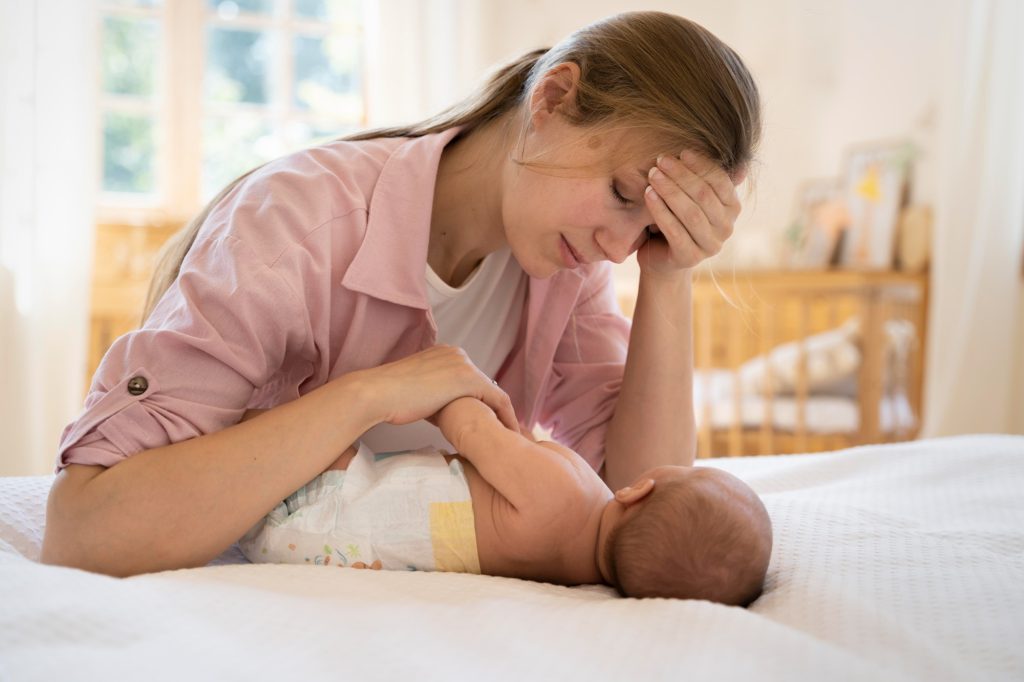Discover how postpartum complications can impact the diagnosis of back pain.
How Other Postpartum Complications Can Affect Diagnosis of Back Pain
Imagine finally making it through the rollercoaster ride of pregnancy and childbirth, only to be hit with a new wave of discomfort – postpartum back pain. But here’s the kicker: this back pain might not just be from the wear and tear of caring for your bundle of joy. In fact, it could be linked to a whole host of postpartum complications that you never even knew existed!
Understanding Postpartum Complications
Before we dive into the intriguing world of postpartum back pain, let’s first get acquainted with some of the common postpartum complications that can join forces with this villainous backache. Yeah, talk about a party pooper.

Defining Postpartum Period
The postpartum period refers to the first six weeks after giving birth. It’s like an extended vacation, but without the margaritas and sandy beaches… unfortunately. During this time, a woman’s body goes through a flurry of changes as it adjusts to life after baby.
Imagine the postpartum period as a rollercoaster ride. Just when you thought the wild ride of pregnancy was over, you strap yourself in for another thrilling adventure. Your body, which has been the nurturing home for your little one, now needs to recover and heal.
During this period, your hormones are in a state of flux. Estrogen and progesterone levels, which skyrocketed during pregnancy, drop dramatically. This hormonal rollercoaster can lead to a wide range of emotions, from euphoria to the baby blues. It’s like being on an emotional seesaw, trying to find balance amidst the chaos.
But it’s not just your emotions that are in flux. Your body is also going through some major changes. Your uterus, which expanded to accommodate your growing baby, now needs to shrink back to its pre-pregnancy size. This process, known as involution, can cause cramping and discomfort.
Common Postpartum Complications
Now, brace yourself for the laundry list of complications that could make their unwelcome appearance in the postpartum period. We’re talking about things like postpartum depression, uterine infections, and even the dreaded pelvic organ prolapse. Oh, joy!
Postpartum depression, also known as the “baby blues,” is a condition that affects many new mothers. It’s like a dark cloud that hangs over the joyous occasion of welcoming a new life into the world. This sneaky devil can manifest itself as everything from mood swings and intense sadness to feelings of guilt and worthlessness. It’s important to seek support and treatment if you suspect you may be experiencing postpartum depression.
Uterine infections, on the other hand, are like unwelcome guests crashing the postpartum party. Just when your uterus thought it had done enough work, it can get infected and cause a variety of nasty symptoms like fever, abdominal pain, and a funky smell. These infections, if left untreated, can lead to serious complications and should be addressed promptly by a healthcare professional.
And then there’s the dreaded pelvic organ prolapse. Imagine a misplaced party balloon, but instead of floating around playfully, it’s your bladder, uterus, or rectum gradually making its way downward. Not fun. Pelvic organ prolapse can occur due to weakened pelvic floor muscles, which can happen during childbirth. This condition can cause discomfort, urinary incontinence, and a feeling of pressure or heaviness in the pelvic area. It’s important to seek medical attention if you suspect you may be experiencing pelvic organ prolapse.
So, as you can see, the postpartum period is not all rainbows and butterflies. It’s a time of adjustment, both physically and emotionally. But with the right support and care, you can navigate through these complications and emerge stronger on the other side.
The Connection Between Postpartum Complications and Back Pain
Alright, now that we’ve got the basic rundown on postpartum complications, let’s dive into the juicy stuff – the connection between these complications and your achy-breaky back.
The Role of Hormonal Changes
Oh, hormones… they can be like that friend who overstays their welcome at the post-baby party. During the postpartum period, hormonal changes are as common as dirty diapers. These hormonal fluctuations can wreak havoc on your body, including your spine. Yep, blame it on the hormones.
When you give birth, your body goes through a major hormonal shift. Estrogen and progesterone levels drop significantly, while prolactin levels rise to support breastfeeding. These hormonal changes can lead to ligament laxity, making your joints and ligaments more vulnerable to strain and injury. This increased laxity can affect the stability of your spine, contributing to back pain.
Additionally, hormonal changes can also affect the neurotransmitters in your brain that regulate pain perception. Lower levels of estrogen, for example, have been linked to an increased sensitivity to pain. So, not only are your hormones wreaking havoc on your ligaments, but they’re also messing with your pain threshold. Thanks, hormones!
Impact of Physical Stress and Recovery
As if pushing a baby out of your body wasn’t enough physical stress, add in the sleepless nights, constant carrying, and breastfeeding acrobatics. Your body has been through the wringer, and your back is feeling the effects. It’s like a never-ending workout, minus the cool workout gear.
During pregnancy, your body undergoes significant changes to accommodate the growing baby. Your center of gravity shifts, putting extra strain on your back. The abdominal muscles, which provide support to the spine, stretch and weaken, further compromising the stability of your back. These changes, combined with the physical demands of caring for a newborn, can lead to muscle imbalances and postural issues that contribute to back pain.
Recovery after childbirth is a process that takes time. Your body needs to heal from the trauma of childbirth, and this healing process can also impact your back. Scar tissue from a C-section or episiotomy can cause restrictions in the fascia, the connective tissue that surrounds and supports your muscles. These restrictions can create tension and imbalances in the muscles of your back, leading to discomfort and pain.
Furthermore, the lack of sleep and constant physical demands of caring for a newborn can leave you feeling fatigued and more prone to poor posture and body mechanics. Slouching while breastfeeding, lifting and carrying your baby without proper form, and spending long hours hunched over changing diapers can all contribute to back pain.
In conclusion, postpartum complications and back pain are closely intertwined. Hormonal changes can affect the stability of your spine and alter your pain perception, while physical stress and the recovery process can lead to muscle imbalances and postural issues. It’s important to prioritize self-care and seek appropriate medical advice and treatment to alleviate and prevent back pain during the postpartum period.
Misdiagnosis of Postpartum Back Pain
Now, let’s talk about the unfortunate reality of misdiagnosis. It can feel like the ultimate plot twist in your postpartum journey.
Postpartum back pain is a common issue that many new mothers face. It can be caused by a variety of factors, including the physical strain of pregnancy and childbirth, hormonal changes, and the demands of caring for a newborn. However, despite its prevalence, postpartum back pain is often misdiagnosed or overlooked.
Overlapping Symptoms with Other Complications
Here’s the tricky part: many postpartum complications have the audacity to share similar symptoms with postpartum back pain. It’s like they’re playing hide-and-seek with your sanity.
For example, postpartum depression, which affects approximately 1 in 7 new mothers, can cause physical symptoms such as fatigue, muscle aches, and difficulty sleeping. These symptoms can easily be mistaken for postpartum back pain, leading to a misdiagnosis and delaying appropriate treatment.
Additionally, conditions such as urinary tract infections, pelvic floor dysfunction, and even gallbladder issues can present with symptoms that mimic postpartum back pain. The overlapping nature of these symptoms can make it challenging for healthcare providers to differentiate between the various conditions, further complicating the diagnosis process.
Challenges in Accurate Diagnosis
As if overlapping symptoms weren’t enough, there are other challenges standing in the way of getting an accurate diagnosis. Sometimes healthcare providers might not fully understand the complexity of postpartum complications or overlook them altogether. It’s like trying to solve a Rubik’s cube blindfolded – frustrating and seemingly impossible.
One of the main challenges is the lack of awareness and education surrounding postpartum back pain. Many healthcare providers may not receive adequate training on this specific issue, leading to a lack of knowledge and understanding when it comes to diagnosing and treating it.
Furthermore, the time constraints and demands of a busy healthcare setting can also contribute to misdiagnosis. In a rushed appointment, healthcare providers may not have sufficient time to thoroughly evaluate a new mother’s symptoms, leading to a quick and potentially inaccurate diagnosis.
Another challenge is the subjective nature of pain. Postpartum back pain can vary in intensity and location, making it difficult to pinpoint the exact cause. This subjectivity can further complicate the diagnostic process and increase the likelihood of misdiagnosis.
In conclusion, misdiagnosis of postpartum back pain is a frustrating reality for many new mothers. The overlapping symptoms with other complications and the challenges in accurate diagnosis make it a complex issue to navigate. It is essential for healthcare providers to receive proper education and training on postpartum complications to ensure accurate diagnosis and appropriate treatment for new mothers experiencing back pain.
The Importance of Comprehensive Postpartum Care
Now that we’ve navigated the treacherous waters of complications and misdiagnosis, let’s talk about why comprehensive postpartum care is an absolute game-changer.
Preventing Complications and Misdiagnosis
One of the biggest benefits of comprehensive postpartum care is the ability to prevent complications and, subsequently, the misdiagnosis of postpartum back pain. Knowledge is power, people!
Promoting Holistic Health and Recovery
Comprehensive care takes into account all aspects of a woman’s health, from the physical to the emotional. It helps ensure a smoother recovery by addressing postpartum complications and providing the support necessary to bounce back stronger than ever, like a mama bear protecting her cubs.
Treatment Options for Postpartum Back Pain
So, we’ve covered all the nitty-gritty details of postpartum complications and their sneaky connection to back pain. But what about some good news? Let’s chat about treatment options for that bothersome backache.

Medical Interventions
If you’re not a fan of playing the waiting game, medical interventions may be the way to go. These can include things like physical therapy, medications, or even minimally invasive procedures. It’s like having an army of healthcare professionals at your beck and call.
Non-Medical Pain Management Strategies
If you prefer to take a more natural approach, fear not! There are plenty of non-medical pain management strategies out there. From gentle stretching and yoga to heat therapy and acupuncture – the options are endless. It’s all about finding the method that makes you go, “Ahh, that’s the spot!”
So, the next time you find yourself eyeing that heating pad while wondering why your postpartum back pain just won’t quit, remember that there may be a whole cast of postpartum complications pulling the strings behind the scenes. The key is to stay informed, seek comprehensive care, and explore all your treatment options. After all, Mama knows best – and she deserves a pain-free journey into motherhood!



